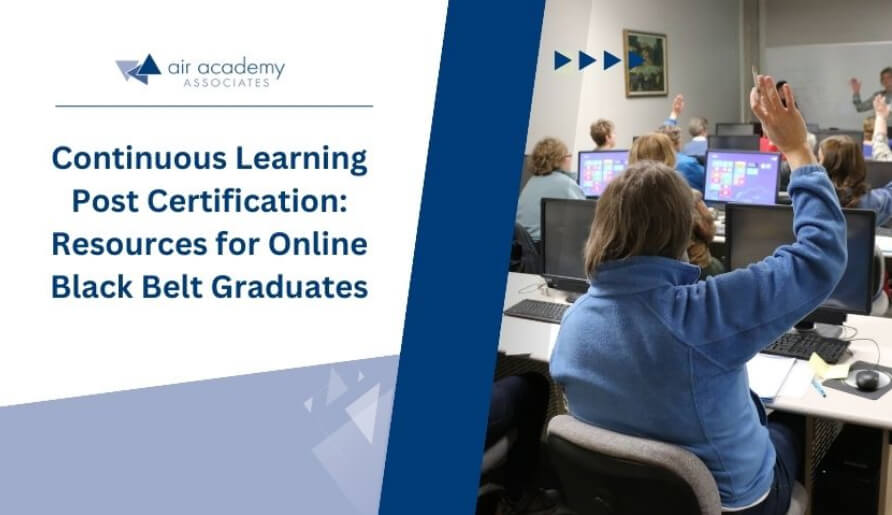
The journey of a Black Belt doesn’t end with certification. The true essence of a Black Belt lies in continuous learning and refining one’s skills as an online Black Belt graduate. Staying updated with the latest trends, methodologies, and tools in the field is crucial. This post aims to provide a comprehensive list of resources to aid this continuous learning journey. Let’s dive in!
Sources for Online Black Belt Graduates
Six Sigma Online Journals and Publications
Staying updated with the latest in Six Sigma is crucial, and online journals and publications serve as primary sources for this. Originating from various academic institutions and Six Sigma organizations, these journals emphasize the importance of keeping up-to-date with the latest research, case studies, and methodologies. They often feature peer-reviewed articles, ensuring the credibility and reliability of the information.
Insights from industry experts provide a practical perspective, while real-world case studies offer a glimpse into applying Six Sigma methodologies across different sectors. For continuous learning, professionals might consider subscribing to these journals or visiting their online portals regularly.
Lean Six Sigma Webinars and Workshops
Webinars and workshops have become indispensable tools for interactive learning in the digital age. These sessions, often led by industry experts with years of experience, blend theoretical knowledge and practical application. They are typically topic-specific, allowing for an in-depth exploration of particular areas of interest. Some key features of these webinars and workshops include:
- Deep dives into specific Six Sigma topics.
- Q&A sessions for direct interaction with experts.
- Hands-on exercises and simulations for practical understanding.
Online Six Sigma Forums and Communities
The digital world offers a plethora of forums and communities dedicated to Six Sigma enthusiasts. These platforms are a hub for global ideas, experiences, and challenges professionals face. Engaging in these forums can be immensely beneficial for collaborative learning and problem-solving. By actively participating, Black Belt graduates can:
- Pose questions and seek solutions.
- Share their experiences and insights.
- Benefit from the collective wisdom of a global community.
Advanced Six Sigma Books and eBooks
Books have always been a reservoir of knowledge, and in the realm of Six Sigma, they offer structured and comprehensive insights. Available on various online platforms, these books, penned by esteemed authors, serve as a reference for both novices and experts. Some notable features of these books include:
- Detailed insights into Six Sigma methodologies.
- Practical tools and techniques for real-world application.
- A blend of theoretical knowledge and case studies.
Six Sigma Conferences and Seminars
Conferences and seminars present a unique opportunity to immerse oneself in Six Sigma. Organized by leading industry bodies and academic institutions, these events emphasize networking, gaining insights from pioneers in the field, and understanding global trends. Attendees can expect:
- Keynote sessions from industry leaders.
- Panel discussions offer diverse perspectives.
- Workshops for hands-on experience and skill enhancement.
By leveraging these resources, professionals can ensure they remain at the forefront of Six Sigma methodologies and practices.
Digital Tools and Platforms for Six Sigma Practitioners
In today’s digital age, technology plays a pivotal role in enhancing the efficiency and effectiveness of Six Sigma methodologies. Leveraging the right tools can streamline processes, facilitate data analysis, and foster team collaboration.
Here’s a look at some of the digital tools and platforms that can be invaluable for Six Sigma practitioners:
1. Statistical Analysis Software
Data drives Six Sigma, and having robust statistical software is essential for analyzing this data. Tools like Simware Pro or Quantum XL offer a range of statistical functions that can aid in process improvement and problem-solving.
Features:
- Comprehensive data analysis capabilities.
- Graphical representation of data for better visualization.
- Regression analysis, hypothesis testing, and more.
2. Process Mapping Tools
Visualizing processes is a fundamental aspect of Six Sigma. Digital platforms that allow for process mapping can help teams understand the flow of processes, identify bottlenecks, and strategize improvements.
Features:
- Drag-and-drop interface for easy mapping.
- Collaboration features for team inputs.
- Integration capabilities with other enterprise software.
3. Project Management Platforms
Managing a Six Sigma project requires coordination, timeline tracking, and resource allocation. Platforms like Trello or Asana can help practitioners keep projects on track and ensure all team members are aligned.
Features:
- Task assignment and progress tracking.
- Timeline visualization and deadline reminders.
- Collaboration tools for team communication.
4. Simulation Software
Before implementing changes, it’s beneficial to simulate the outcomes. Simulation software allows teams to model different scenarios and predict outcomes, ensuring that the chosen solution is optimal.
Features:
- Real-time simulation capabilities.
- Scenario comparison for optimal decision-making.
- Integration with data analysis tools for comprehensive insights.
5. Continuous Learning Platforms
The world of Six Sigma is constantly evolving. Platforms that offer online courses, tutorials, and webinars can help practitioners continue their education and stay updated with the latest trends and methodologies.
Features:
- Access to a library of courses and tutorials.
- Interactive quizzes and assessments.
- Certifications and badges to showcase learning.
Conclusion
The path of continuous learning is what truly defines a Black Belt. The resources listed above are just a starting point. As the world of Six Sigma and Lean methodologies continues to evolve, Black Belt graduates must stay proactive in their learning journey.
By leveraging these resources, one can refine their skills and contribute to the broader community, ensuring that the spirit of Six Sigma remains vibrant and impactful. Remember, the journey of a Black Belt is a lifelong commitment to excellence, and with the right resources, the sky’s the limit!
Dive deeper into Six Sigma methodologies with our Lean Six Sigma Black Belt Online Course. Start your transformative journey today!


